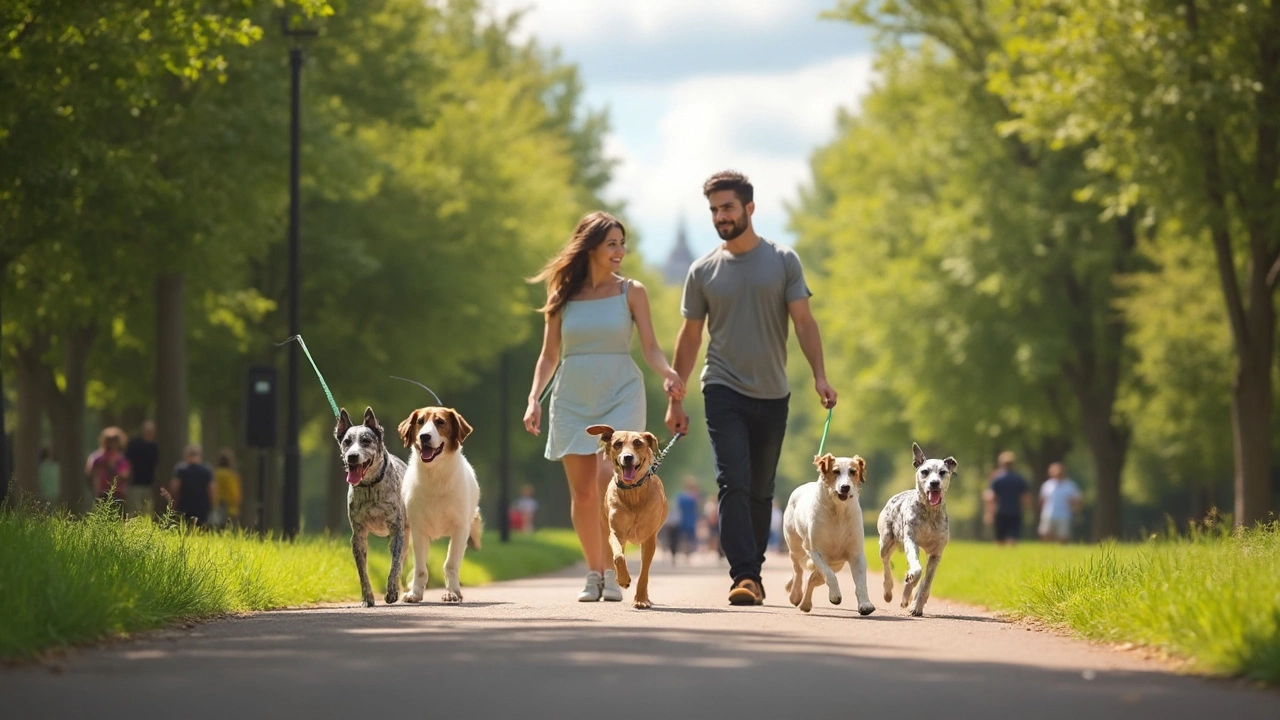So, you're thinking about getting a dog? Whether you're leaning towards buying one from a breeder or adopting from a shelter, it's crucial to weigh your options carefully. Each choice comes with its own set of pros and cons, and understanding them can help you make the best decision for you and your future furry friend.
Adopting a dog often means giving a homeless pup a second chance at life. Shelters are filled with dogs of all shapes, sizes, and personalities, just waiting for someone to take them home. Plus, adoption fees usually cover vaccinations, microchipping, and sometimes even spaying or neutering, so it’s a pretty sweet deal financially.
On the flip side, buying a dog from a breeder might be the way to go if you're looking for a specific breed with predictable characteristics. But remember, this option often comes with a heavier price tag. More importantly, it requires finding a reputable breeder who treats their dogs right.
- The Benefits of Adopting a Dog
- What to Expect When Buying a Dog
- Factors to Consider Before Deciding
- The Financial Side of Dog Ownership
- Matching Your Lifestyle with the Right Dog
The Benefits of Adopting a Dog
Adopting a dog might just be one of the most rewarding choices you can make if you’re considering a new furry friend. Think about it: when you adopt, you're literally saving a life. Shelters are often filled to the brim with dogs eagerly waiting for their forever homes. By adopting, not only do you give a dog a second chance, but you also free up space and resources for other animals in need.
One of the big perks of adopting a dog is the cost aspect. Adoption fees are generally way lower compared to buying a dog. For around $50 to $200, your new pup usually comes with vaccinations, microchipping, and sometimes even spaying or neutering. That's a great deal compared to the thousands you might spend for a purebred pup from a breeder, where you also have to cover these additional costs yourself.
When you visit a shelter, you get a chance to interact with the dogs and see which one clicks with you. Shelters often provide temperament assessments, so you can find a dog that suits your lifestyle perfectly. Whether you need a jogging buddy or a couch potato, there’s likely a dog waiting that fits the bill.
Plus, let’s not forget the warm fuzzies you get from knowing you've made a difference in a dog's life. You'll join a supportive community of pet lovers that have a shared mission of improving animal welfare.
Here's a quick look at some typical adoption costs versus buying:
| Option | Approximate Cost |
|---|---|
| Adoption | $50 - $200 |
| Buying a Purebred | $500 - $3,000+ |
Choosing to adopt not only makes financial sense but also aligns with a growing movement towards ethical pet ownership. By adopting, you’re actively participating in a community that values giving every dog a fair shot at happiness.
What to Expect When Buying a Dog
When you decide to buy a dog, you're stepping into a world that's a bit different from the adoption process. First off, it's important to research and find a reputable breeder. A good breeder should provide you with health records, ensure the puppies are socialized, and let you meet the puppy's parents. It's about ensuring that your future pet is coming from a place where it was treated well and given the best start in life.
One major thing to prepare for is the cost. Buying a dog, especially a purebred or designer breed, can be pricey. Unlike shelters, breeders often don't cover initial health expenses, so factor in the cost of vaccinations, vet check-ups, and microchipping if they’re not included.
Here are some steps to guide you through the process:
- Research Breeds: Consider what type of dog fits your home and lifestyle. Some breeds are more energetic, while others prefer a chill environment.
- Visit Breeders: Arrange visits to check out the facilities personally. This helps you inspect the living conditions and see how well the dogs are cared for.
- Ask Questions: Don’t be shy about asking the breeder about health issues, behavioral traits, and any other concerns you have.
- Prepare for Home Arrival: Have the basic supplies ready—dog bed, bowls, food, and toys. Transitioning to a new home is a big deal for a puppy, so make it as smooth as possible.
Remember, when you buy a dog, it's not just about the cuteness factor. You’re also choosing a companion for hopefully 10-15 years or more. Consider your time, energy, and budget for this commitment, and you'll be setting yourself and your little buddy up for a great journey together.

Factors to Consider Before Deciding
Before jumping to make a decision on whether to buy or adopt a dog, it's important to consider a range of factors. Making an informed choice can lead to a happier life for both you and your potential new buddy.
First off, think about your living situation. Do you have ample space for a big, energetic dog, or would a smaller, more low-key pup be a better fit? Apartment dwellers, for instance, might need to be more mindful of size and energy levels when considering a new pet.
Next, your lifestyle matters a ton. If you're someone who loves outdoor activities, a high-energy breed might match your routine. Meanwhile, if you're more of a homebody, a lap dog might be just what you need. Consider how much time you can realistically devote to training, exercising, and spending quality time with your pet.
The financial aspect is also big. Pet adoption usually involves lower initial costs compared to buying from a breeder. But remember, you’ll need to budget for ongoing expenses like food, vet visits, toys, and grooming, which table below might help you visualize:
| Expense | Estimated Cost per Year |
|---|---|
| Food | $200 - $600 |
| Vet visits | $300 - $500 |
| Grooming | $20 - $500 |
| Toys & Supplies | $50 - $150 |
Also, think about the age of the dog. Puppies are adorable but come with a steep learning curve. They need intense training and lots of patience. Adult dogs, meanwhile, might come trained, but could have past experiences that make them unique.
Lastly, consider the emotional aspect. Are you ready for the commitment? A dog can be a 10 to 15-year journey. Be sure you've thought about the long term before bringing one home.
By weighing all these factors, you'll be in a better spot to make a decision that leaves no regrets. What’s most important is finding a pet who fits perfectly into your world.
The Financial Side of Dog Ownership
Bringing a dog into your life is a rewarding move, but it’s not just about cuddles and games of fetch. There's a financial commitment that comes along with it, and it’s smart to plan ahead.
First up, consider the initial costs. If you decide to buy a dog, be ready to shell out anywhere from a few hundred to a couple of thousand bucks, depending on the breed. On the other hand, adopting usually runs between $50 and $300, covering essential health check-ups.
So, what about ongoing expenses? Think food, regular vet visits, and grooming. Good quality dog food can cost anywhere from $20 to $60 a month. Vet visits for routine checkups might set you back $100 to $300 annually. Then there are surprises like sudden illnesses or injuries, which could easily rack up high bills.
"Owning a pet can cost around $500 to $2,000 a year, mainly depending on the dog’s size, health, and care needs," says Jane Doe from the Pet Care Society.
To give you a quick peek, here’s a rough breakdown:
| Expense | Annual Cost |
|---|---|
| Food | $240 - $720 |
| Vet Visits | $100 - $300 |
| Grooming | $30 - $500 |
| Miscellaneous (toys, treats, etc.) | $100 - $300 |
Plus, don’t forget about training classes if your dog needs them. Those can range from $30 a session to $300 for a series of lessons.
Here’s a tip: setting up a small emergency fund exclusively for your pet can help you handle unexpected costs without stress. All in all, owning a dog is definitely worth it, but knowing what you’re getting into financially is half the battle.

Matching Your Lifestyle with the Right Dog
Finding the perfect dog isn’t just about spotting those cute puppy eyes; it’s about finding one that fits your everyday life. The routine, space, and energy you have all play a role in how well your new furry buddy gets along with you. Let’s get into some nitty-gritty details to match you with your perfect canine companion.
First off, think about your activity level. Are you someone who loves a run at dawn or do you prefer Netflix marathons on the couch? Energetic breeds like Border Collies or Labradors thrive with lots of exercise and mental stimulation. On the flip side, if your idea of fun involves a slower pace, consider chill dogs like Bulldogs or Basset Hounds. They’re more into leisurely strolls and nap time.
Your living situation matters too. Living in a cozy apartment? Compact breeds like French Bulldogs or Dachshunds usually adapt better to smaller spaces. But if you have a house with a spacious yard, larger breeds like Retrievers or German Shepherds can make great companions, as they have room to roam.
Don’t forget about time and attention. All dogs need love and playtime, but some demand more of your time than others. If you’re working long hours or travel a lot, independent breeds like Shiba Inus or Chow Chows can handle being alone for longer periods. However, if you’re home often and can shower a dog with affection, Poodles or Cocker Spaniels might be the perfect pals.
Got kids or other pets? You’ll want a dog that plays nice with others. Breeds known for being sociable, like Golden Retrievers or Beagles, usually get along well with children and other animals.
- Dog adoption gives you the chance to choose from mixed breeds, who often combine the best traits of many types of dogs. They might surprise you in the best way!
- Consider allergies. Some dogs are more hypoallergenic, like Poodles or Schnauzers, which is a win if sneezing isn’t your thing.
- Look into a breed’s lifespan and potential health problems. Planning for the long-term commitment is key.
At the end of the day, the best dog is one that seamlessly becomes part of your life. So, think about these points and you’ll be one step closer to finding the right one. After all, no matter if you buy a dog or go for pet adoption, fitting into each other’s lives happily is what makes the journey worthwhile.

